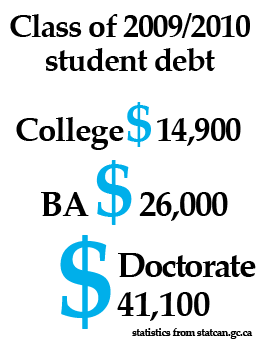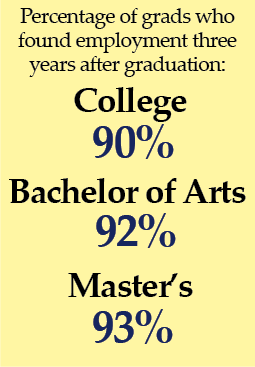BRITTANY PREOCANIN
Students need to stop being taught the myth that university is the only option for a successful career.
It is the teaching style, available opportunities and impact of instructors that provide students with any chance of obtaining a job.
The Conference Board of Canada conducted research that suggests the type of institution attended may not be as important as the program a student enrolls in.
University students with a Bachelor of Arts degree are the most likely to continue post-secondary education after their undergrad.
In an article in the Globe and Mail, president and CEO of Colleges Ontario Linda Franklin said, “In the last five years in Ontario, we have seen a 40 per cent increase in university graduates going to college.”
Popular opinion is that universities put more focus on the study of theory and analysis, with the average university class size greatly eclipsing the average college classroom.
But don’t fret; college is another option, with smaller class sizes, a strong focus on hands-on curriculum, internship opportunities and an overall growth of connections.
However, according to a study by the Association of University and Colleges Canada, university graduates are much more likely to be hired than those who attended college.
The study, published in 2011, reports that in the past 20 years, 1.5 million new jobs were created for “professional and management occupations.” Approximately 1.3 million of these positions were filled by university graduates. Some of these occupations include scientists, lawyers and doctors.
This is why in late January, Grade 12 students are pushed toward a university education as they apply to their top three institutions.
“There was an expectation from my parents and my friends, everyone was going to university,” said Karyn Husack, 30, who has multiple degrees and now works as a home warranty specialist.
In all honesty, the word “university” has a pompous, all-empowering persona.
However, this former student will tell you exactly how easy it is to skip class, when you are one of hundreds of students in a room with one professor.
I entered my first year at McMaster University without even knowing what to do with my fancy piece of paper.
Ken Coates, the Canada Research Chair in Regional Innovation, wrote in a piece for CBC: “For some Canadian high school graduates, going to university is an impressive and valuable option. For others, it is an expensive and time-consuming exercise in self-discovery and, often, failure.”
The bigger problem is that many university students are racing into professions as doctors, teachers, lawyers and engineers and leaving Bachelor of Arts students behind in the dust.
What if you’re a student who isn’t interested in a profession or management career?
There is hope. Poly-techs such as Sheridan, Seneca and Humber provide experienced instructors in specific fields of study.
These instructors have the expertise and, more importantly, the professional knowledge to teach their classes how to apply the textbook theory, use practical skills and build a portfolio by the time graduation comes around.
The schools create an active learning environment for students aspiring to careers outside of university-oriented professions.
“It made me feel like the professors really cared about my success, unlike university where I just felt like a number,” said Andrea Irvine, who attended the University of Ottawa and is now an intern at the Canada Business Network. “I found that Algonquin College was more useful. It taught me far more real-life, applicable skills.”
So why push for university after high school and leave college as a backup plan? For students unsure of a career, or know a profession isn’t for them, college should be the first choice.
Some college graduates who had no clue what career was right for them found that starting off with a diploma helped in the transition of high school to post-secondary.
College seems to be a bridge that allows students the time to mature to a university level of thinking. The advantage is many college programs can be linked to university programs, where students have the opportunity to transfer credits and obtain a degree in fewer years, among other options.
“I would suggest for people to do both [college and university],” said Catherine Hartnett, a skills instructor and recreational assistant with the City of Hamilton. “I received knowledge over the years going to Mohawk and I grew up more.”
Hartnett studied sociology at Wilfrid Laurier University for a year after graduating high school, but the program didn’t meet her expectations at providing a foreseeable career.
The other issue is that university students might not be encouraged to keep up with the market economy. Those who earn a degree may enter a competitive job market that has shifted from resource- to service-based.
“I didn’t see that there was way too many people going into teaching, and now the market is so flooded,” said Husack, who has a history degree, a Masters in English literature and a certificate in English as a second language.
Paying attention to the market economy can discourage many students from a career that has no relation to their years of education. It will allow students to plan ahead and know what program to enrol in based on career availability.
When choosing an institution to attend, college is often overlooked rather than encouraged. The university degree in a profession might lead to a certain salary bracket, but the diploma is where available experience and connections give students an advantage in the real world.
For most careers, a college diploma should carry as much – or more – weight on a resume as the word “degree” does.
If not, the job market will eventually be flooded with bartenders and baristas who have a $30,000 wall decoration.



Comments
One response to “It’s time to end the university upsell”
Great article – something that I have been advocating for MANY years!! Just wondering – the stat that says 92% of grads with a B.A. find employment – do we know what type of employment? Because I would hazard a guess that it is most definitely not in their field of study, whereas those with a college diploma likely DID find employment in their field of study.
I too graduated with a degree in social sciences (sociology-anthropology) and then went to Algonquin College.(Public Relations diploma – with honours because I learned much better than when in a university environment). There were 29 people accepted to PR – 11 of us already had a university degree, all of us but two actually had some level of university experience. Two people came directly from high school. One quit in the first term, the second finished, and then went on to take Communications at university.
To me, a university/college or college/university combination is very effective. I truly hope that our schools can start exploring different options.
I want to help society change the focus on university – it is not the best solution for everyone.